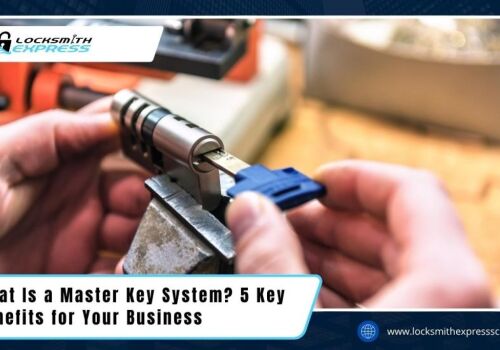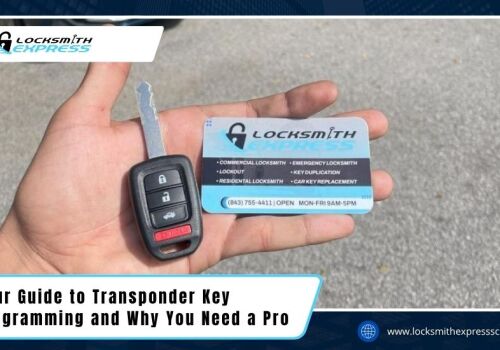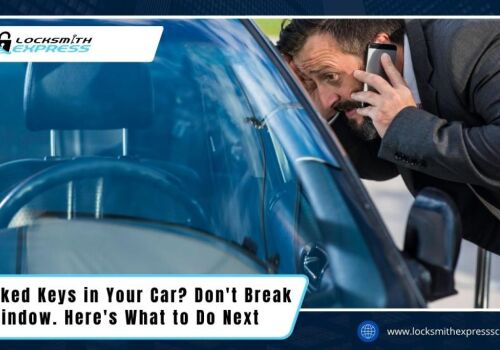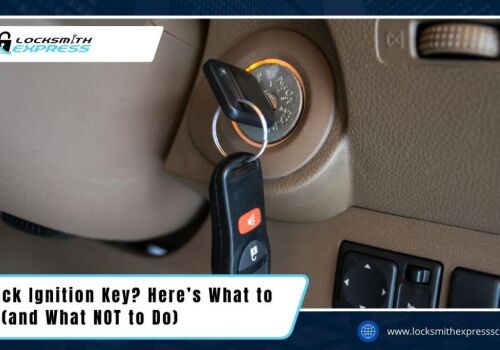Knowing the different types of commercial door locks is critical for securing your business properly. The best lock for your property depends entirely on the door's location and how much traffic it receives. For a high-traffic main entrance, a Grade 1 mortise lock offers the best security and durability.
For less-used interior doors, a standard cylindrical lock is often sufficient. Emergency exits must have panic bars for safety compliance, and electronic locks provide excellent keyless access control for employee-only areas. This guide breaks down these options to help you choose the right hardware for every door.
- Understanding Commercial Lock Grades (ANSI/BHMA)
- Quick Comparison Table: Lock Grades
- Key Types of Commercial Door Locks
- Mortise Locks
- Cylindrical Locks
- Panic Bars (Exit Devices)
- Mortise vs Cylindrical: Quick Comparison
- Electronic & Keypad Locks
- How to Choose the Right Lock for Your Business
- Secure Your Business with the Right Commercial Door Lock
- Frequently Asked Questions
- What is the difference between a mortise and a cylindrical lock?
- What does the lock "grade" mean (Grade 1, 2, 3)?
- What type of lock is best for a front entrance?
- Mortise vs Cylindrical: Quick Comparison
- What are the best commercial lock brands?
- Should I use a keypad or a keyed lock for my business?

Understanding Commercial Lock Grades (ANSI/BHMA)
The grade of a lock is a rating assigned by the American National Standards Institute (ANSI) and Builders Hardware Manufacturers Association (BHMA) that certifies its security and durability after rigorous testing. This grade is the most reliable indicator of a lock's ability to withstand daily use in a commercial environment.
-
Grade 1 Commercial Locks: This is the highest certification a lock can receive. It is tested to withstand at least 800,000 cycles (openings and closings) and significant force. Grade 1 locks are designed for high-traffic, high-abuse areas like public entrances at hospitals, schools, and busy office buildings.
-
Grade 2: This rating indicates a lock suitable for medium-duty commercial use. It is tested for 400,000 cycles and offers a balance of good security and durability for locations like interior office doors or storage closets that don't see constant traffic.
-
Grade 3: This is the lowest rating and is primarily intended for residential use. It is tested for 200,000 cycles and is not recommended for securing a commercial property.
Quick Comparison Table: Lock Grades
|
Grade |
Cycles Tested |
Best For |
Example Locations |
Security Level |
|
Grade 1 |
800,000+ |
Heavy-duty use |
Hospitals, Schools, Public Entrances |
Highest |
|
Grade 2 |
400,000 |
Medium-duty |
Interior Offices, Storage Rooms |
Medium |
|
Grade 3 |
200,000 |
Residential |
Homes, Apartments |
Lowest |
📌 Tip: For main entrances or doors exposed to heavy daily use, always choose Grade 1.

Key Types of Commercial Door Locks
There are four main types of locks used in business settings. Each is designed to solve a different set of security, durability, and safety code requirements.
Mortise Locks
A mortise lock is a heavy-duty lockset that is installed into a deep pocket (a mortise) cut into the edge of the door. This design integrates the lock body, latch, and deadbolt into a single, robust cassette.
Because the entire lock mechanism is housed within the door itself, a mortise lock provides superior strength and resistance to prying or other forms of forced entry. They are highly versatile and are often paired with a strong lever handle. The complex installation makes them a secure, long-term solution for critical entry points.
✅ Best For: High-security main entrances and high-traffic public doors.
Cylindrical Locks
A cylindrical lock is a common type of hardware installed by drilling two holes through the door, a large one on the face and a smaller one on the edge for the latch.
This lock is simpler and more affordable to install compared to a mortise lock. While it is less robust by design, high-quality Grade 1 and Grade 2 cylindrical locks still provide reliable security. Their ease of installation and replacement makes them a practical choice for most interior doors in a commercial building.
The mortise lock vs cylindrical lock debate often comes down to balancing the need for maximum security with budget and installation complexity.

✅ Best For: Interior office doors, supply closets, and other medium-traffic areas.
Mortise vs Cylindrical: Quick Comparison
|
Feature |
Mortise Lock |
Cylindrical Lock |
|
Installation |
Complex |
Simple |
|
Security |
Very High |
Moderate |
|
Durability |
Long-term |
Moderate |
|
Cost |
Higher |
Lower |
|
Best For |
Main Entrances |
Interior Doors |
Panic Bars (Exit Devices)
A panic bar, also known as an exit device or a rim lock, is a door-mounted hardware mechanism that unlatches the door when a push bar is pressed. This hardware is not primarily for security against entry but is a critical life-safety feature.
Building codes mandate that emergency exit doors in public and commercial facilities must allow for fast, unobstructed egress. For businesses needing to meet these codes, professional Panic Bar Installation is essential for ensuring compliance and safety.
✅ Best For: Emergency exit doors and designated egress routes.
Electronic & Keypad Locks
Electronic locks replace traditional keys with a keypad, access card, or key fob, providing a modern way to manage access control. These systems offer significant advantages for businesses, such as the ability to add or revoke access permissions instantly without changing the hardware.
They eliminate the security risks associated with lost or stolen keys and can provide an audit trail of who accessed an area and when. These systems are often integrated with other high-security locks for comprehensive protection.
✅ Best For: Employee entrances, IT rooms, and other restricted areas needing keyless access.
How to Choose the Right Lock for Your Business
Making the right choice comes down to balancing security needs, daily use, and your budget. To select the correct hardware, evaluate each door's specific needs with this simple checklist:
-
Location: Is the door an exterior entrance requiring high security or an interior door?
-
Traffic: How often is the door used daily? High-traffic doors need a Grade 1 rating for durability.
-
Security: How valuable are the assets behind the door? Protect high-value areas with stronger locks.
-
Convenience: Do you need keyless entry or detailed access logs to track who enters and when?

Secure Your Business with the Right Commercial Door Lock
From durable mortise locks for your front door to convenient electronic systems for your offices, each type of commercial lock serves a distinct purpose. Understanding these differences ensures your property remains secure, functional, and compliant. Call Locksmith Express for expert commercial locksmith services.
Get the Right Hardware for the Job. Consult With Our Commercial Lock Experts.
Frequently Asked Questions
What is the difference between a mortise and a cylindrical lock?
A mortise lock is installed into a deep pocket in the door's edge, making it stronger and more secure. A cylindrical lock is installed through a hole drilled through the face of the door, making it easier and cheaper to install, but less robust.
What does the lock "grade" mean (Grade 1, 2, 3)?
The ANSI/BHMA grade rates a lock's durability and security. Grade 1 is the highest standard, built for high-traffic commercial use. Grade 2 is for medium-duty commercial use, and Grade 3 is for residential use.
What type of lock is best for a front entrance?
A Grade 1 mortise lock is typically the best choice for a business's front entrance due to its superior security and durability against heavy use.
What are the best commercial lock brands?
Industry-leading brands known for reliability and high-security hardware include Schlage, Sargent, Medeco, and Corbin Russwin.
Should I use a keypad or a keyed lock for my business?
Use a high-security keyed lock for main entrances where reliability is paramount. Use keypad locks for interior doors or employee entrances where keyless convenience and managing access for multiple users are a priority.






